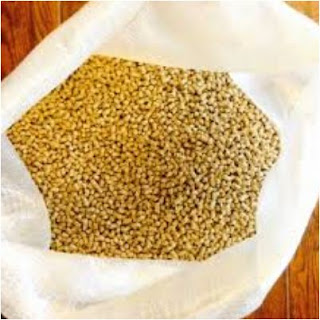Chicken Feed
Chicken Feed For Small to Adult Chicken
Chicken feed is vary from small to adult chicken, for small chicken need more calorie for their growth, and for their health need protein and vitamin. In nature such as domestic chickens will consume 30% of their calories from grass, if allowed to truly "free range." Since grass is very low in calories, another thing chicken’s need is animal protein. Chickens are omnivores, just like the humans they've kept company with for all these millennia.
 |
| Chicken Feed |
The feed formula for chicken also as a nature will arrange by their selves, but if people look after in a cage, this composition may be neglected. This condition can make the chicken immunity to certain diseases will decrease. Mass-producers of poultry are certainly leery of disease, which might bring about the destruction of their entire laying flock. The important thing to compose of chicken feed are the nutrition composition must fulfill the needed for chicken grows and egg production.
But, strictly vegetarian-fed chickens are potentially undernourished. An all-vegetarian diet is not natural for them ~ they need animal protein. The ideal is for a chicken to be free to roam grasslands that are not denuded by too many animals in one place, finding myriad bugs and eating lots of wild plants. If supplemented with grains, and especially with fish meal, these chickens will be the healthiest around, and live and lay eggs for many, many years.
Chickens that are free to consume as much living grass as they want, along with the myriad other living things in a natural grassland or meadow, give significant health benefits to the consumer today, just as this poultry diet has done for the thousands of years of domestication of the chicken. Meat and eggs from grass-fed poultry, which is very low in fat, have high levels of Omega-3 fatty acids. Eggs from "pastured" (another form of "grass-fed") poultry, high in omega-3 fatty acids, will lower one's "bad cholesterol" and raise the "good cholesterol." More and more consensus is emerging that grass-fed or pastured poultry eggs are good for the heart, and that not only should they not be avoided, they should be specifically included in the diet.
There are two main kinds of fatty acids, omega-3 and omega-6. We need approximately equal amounts of the O-3's and the O-6's in our bodies. But, because of not allowing our feed animals to eat grass (even cows don't eat much grass any more ~ they eat largely corn), we are getting huge proportions of Omega-6 fatty acids, and very little Omega-3.
When we are oversupplied with Omega-6, our "bad cholesterol" rises, and our "good cholesterol" stays low. When we get equal amounts of Omega-3's and -6's, the good cholesterol rises and the bad cholesterol drops. But our diets have been so high in Omega-6 for so long, we really need to focus almost exclusively on eating Omega-3-rich foods to balance the levels out.
Poultry, however, needs some grain in the diet. It is very difficult to raise 100% grass-fed poultry. Tests show that even greatly-reduced-grain ration in poultry diets, supplemented with very large free-range grass consumption, still produces meat that is relatively high in Omega-6's compared to the meat and milk of grass-fed ruminants.

<< Home